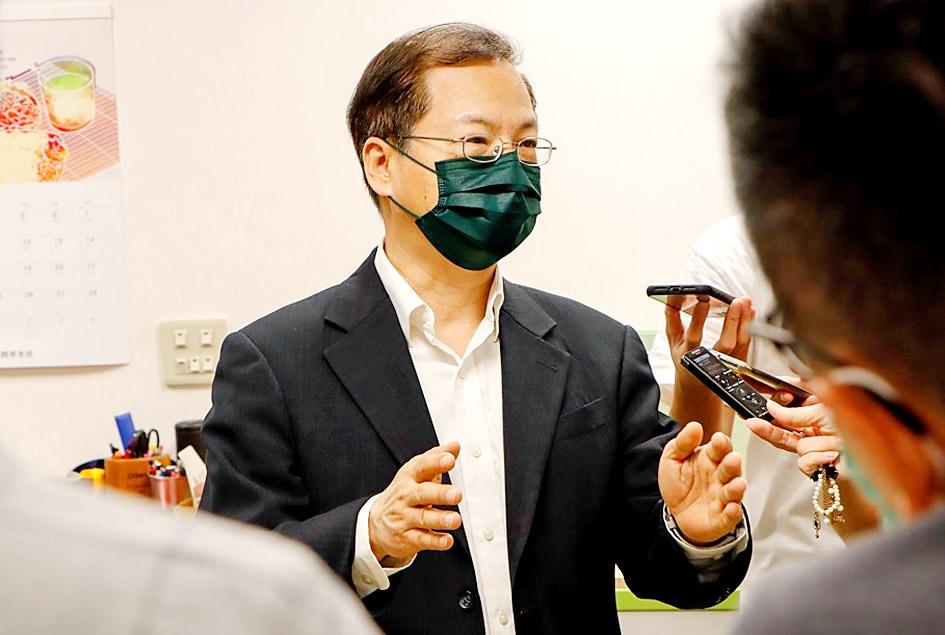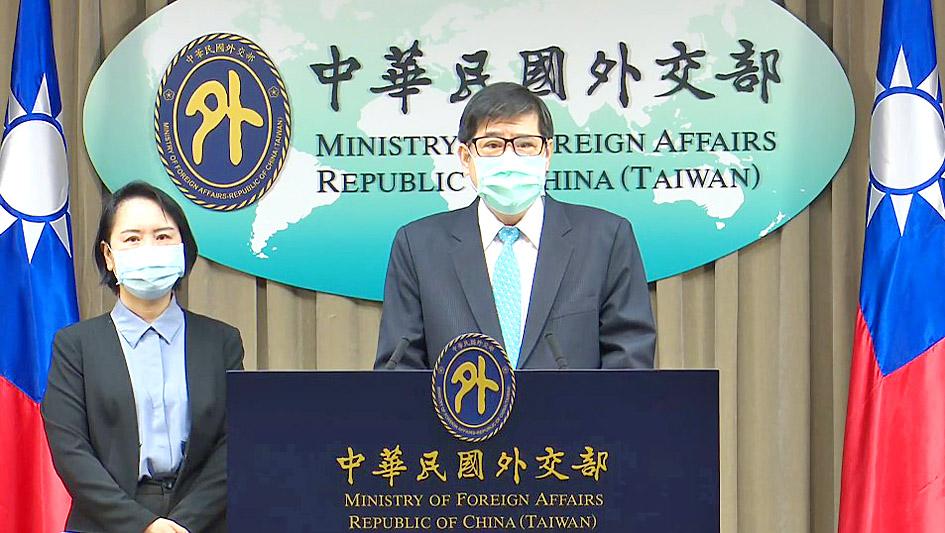A delegation comprising about 65 officials and businesspeople is preparing to visit Lithuania, the Czech Republic and Slovakia next month to explore economic and trade opportunities, the Ministry of Foreign Affairs said yesterday.
The plan was first reported by Chinese-language online news outlet Up Media on Wednesday last week, but the ministry had refused to provide details about the trip until yesterday.
Led by National Development Council (NDC) Minister Kung Ming-hsin (龔明鑫), the delegation would travel to the three nations on a chartered flight from Oct. 20 to 30, Department of European Affairs Director-General Remus Chen (陳立國) told a news conference at the ministry in Taipei.

Photo: National Development Council
Since Czech Senate Speaker Milos Vystrcil led an 89-person delegation to Taiwan last year, the nation has deepened its ties with central and eastern European countries in various areas, Chen said, thanking Lithuania, Slovakia, the Czech Republic and Poland for their donations of COVID-19 vaccines.
The delegation would comprise government officials and business representatives from sectors such as information and communication technology, precision medicine and electric vehicles, he said.
Some disease prevention specialists would accompany the delegation during the visit, he added.

Photo: Lu Yi-hsuan, Taipei Times
The delegation is to explore opportunities for cooperation on smart machinery and smart city infrastructure — pertinent to the three nations’ strength in heavy industries — as well as the digital economy, start-ups and biotechnology, NDC Department of Overall Planning Director-General Connie Chang (張惠娟) said.
A Slovak delegation had planned to visit Taiwan in May, but due to a local COVID-19 outbreak the visit was rescheduled.
During the visit to Slovakia, the delegation would discuss the planned Taiwan trip with their counterparts, Chen said.
Asked about the progress of Lithuania’s plan to open a representative office in Taipei, Chen said the establishment is awaiting Lithuanian government administrative and legal procedures, and that the ministry is awaiting information from Vilnius before it could provide more details.
Preparations for Taiwan’s plan to establish a representative office in Lithuania are running smoothly, he said, adding that the ministry would share more information in due course.
Despite external “coercion,” Taiwan and Lithuania would not falter in their determination to develop their ties, Chen said, without naming China.
Since Lithuania in July decided to host a Taiwanese representative office, Beijing has been pressuring the Baltic nation to drop the plan.
US Secretary of State Antony Blinken, as well as many lawmakers in the European Parliament, have voiced their support for Lithuania’s plan.

MAKING WAVES: China’s maritime militia could become a nontraditional threat in war, clogging up shipping lanes to prevent US or Japanese intervention, a report said About 1,900 Chinese ships flying flags of convenience and fishing vessels that participated in China’s military exercises around Taiwan last month and in January last year have been listed for monitoring, Coast Guard Administration (CGA) Deputy Director-General Hsieh Ching-chin (謝慶欽) said yesterday. Following amendments to the Commercial Port Act (商港法) and the Law of Ships (船舶法) last month, the CGA can designate possible berthing areas or deny ports of call for vessels suspected of loitering around areas where undersea cables can be accessed, Oceans Affairs Council Minister Kuan Bi-ling (管碧玲) said. The list of suspected ships, originally 300, had risen to about

DAREDEVIL: Honnold said it had always been a dream of his to climb Taipei 101, while a Netflix producer said the skyscraper was ‘a real icon of this country’ US climber Alex Honnold yesterday took on Taiwan’s tallest building, becoming the first person to scale Taipei 101 without a rope, harness or safety net. Hundreds of spectators gathered at the base of the 101-story skyscraper to watch Honnold, 40, embark on his daredevil feat, which was also broadcast live on Netflix. Dressed in a red T-shirt and yellow custom-made climbing shoes, Honnold swiftly moved up the southeast face of the glass and steel building. At one point, he stepped onto a platform midway up to wave down at fans and onlookers who were taking photos. People watching from inside

Japan’s strategic alliance with the US would collapse if Tokyo were to turn away from a conflict in Taiwan, Japanese Prime Minister Sanae Takaichi said yesterday, but distanced herself from previous comments that suggested a possible military response in such an event. Takaichi expressed her latest views on a nationally broadcast TV program late on Monday, where an opposition party leader criticized her for igniting tensions with China with the earlier remarks. Ties between Japan and China have sunk to the worst level in years after Takaichi said in November that a hypothetical Chinese attack on Taiwan could bring about a Japanese

The WHO ignored early COVID-19 warnings from Taiwan, US Deputy Secretary of Health and Human Services Jim O’Neill said on Friday, as part of justification for Washington withdrawing from the global health body. US Secretary of State Marco Rubio on Thursday said that the US was pulling out of the UN agency, as it failed to fulfill its responsibilities during the COVID-19 pandemic. The WHO “ignored early COVID warnings from Taiwan in 2019 by pretending Taiwan did not exist, O’Neill wrote on X on Friday, Taiwan time. “It ignored rigorous science and promoted lockdowns.” The US will “continue international coordination on infectious